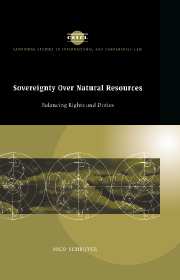Book contents
- Frontmatter
- Contents
- List of boxes, figures and tables
- Preface
- Acknowledgments
- List of abbreviations
- List of main symbols used in UN documents
- Glossary
- Table of cases
- 1 Introduction
- PART I The birth and development of the principle: the UN General Assembly as midwife
- PART II Natural-resource law in practice: from creeping national jurisdiction towards international co-operation
- PART III Balancing rights and duties in an increasingly interdependent world
- Introductory remarks to Part III
- 9 Rights and claims: seeking evidence of recognition in international law
- 10 Duties: the other side of the coin
- 11 Sovereignty over natural resources as a basis for sustainable development
- Appendices
- Bibliography
- Index
- Books in the series
10 - Duties: the other side of the coin
Published online by Cambridge University Press: 23 October 2009
- Frontmatter
- Contents
- List of boxes, figures and tables
- Preface
- Acknowledgments
- List of abbreviations
- List of main symbols used in UN documents
- Glossary
- Table of cases
- 1 Introduction
- PART I The birth and development of the principle: the UN General Assembly as midwife
- PART II Natural-resource law in practice: from creeping national jurisdiction towards international co-operation
- PART III Balancing rights and duties in an increasingly interdependent world
- Introductory remarks to Part III
- 9 Rights and claims: seeking evidence of recognition in international law
- 10 Duties: the other side of the coin
- 11 Sovereignty over natural resources as a basis for sustainable development
- Appendices
- Bibliography
- Index
- Books in the series
Summary
The concept of duties
Once the principle of permanent sovereignty over natural resources had been formulated, its legal evolution focused initially, as we saw, on the rights arising from it. For obvious reasons States are inclined to formulate rights expanding their sovereignty rather than obligations restricting it. They tend to consider the latter as an encroachment on their sovereignty. Similarly, academic discussion on the content of permanent sovereignty has long focused on the rights emanating from it, in particular the right to take foreign property.
Less attention has been paid to the question whether duties are incumbent on States in the exercise of their permanent sovereignty over natural resources and if so what they entail. This chapter intends to analyze what kind of duties the principle of permanent sovereignty may give rise to, especially for States. As in previous chapters, it takes as a starting point the set of permanent-sovereignty-related UN resolutions analyzed in Part I and investigates to what extent permanent-sovereignty-related duties have become recognized in treaty law, State practice, decisions of international courts and tribunals, the work of international law bodies and in international law literature. Only those treaties which have a bearing on the exercise of permanent sovereignty over natural resources are discussed with.
- Type
- Chapter
- Information
- Sovereignty over Natural ResourcesBalancing Rights and Duties, pp. 306 - 367Publisher: Cambridge University PressPrint publication year: 1997

